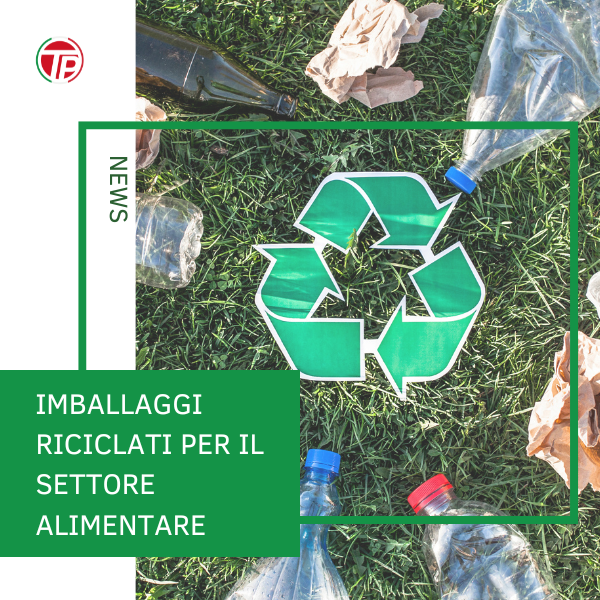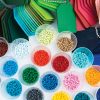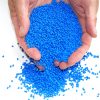The topic of recycling and more generally of environmental sustainability is among the most delicate and debated worldwide. In particular, as regards recycled plastics for food, we are in a transition phase, in which the legislator on the one hand must deal with a past regulatory vacuum and on the other find effective and rapid solutions for the immediate future, which take into account all the subjects involved.
The characteristics of food packaging
In the food industry it is essential that food is preserved in a way that is safe for human health.. Consequently, the packaging containing it must be compliant and suitable for contact. This means that “under normal or foreseeable conditions of use, they do not transfer components to foodstuffs in quantities such as to:
(a) constitute a danger to human health;
(b) cause an unacceptable change in the composition of food products;
or
c) cause a deterioration in their organoleptic characteristics” (Source: Community Regulation 1935/2004 – art.3).
Currently, according to Italian law, the manufacturer of food packaging must provide a declaration attesting its suitability for contact with food products.
The attention towards recycled plastic materials and those intended for contact with food is therefore very high especially because some fundamental steps have not yet been fully clarified by the European Community. Considering also that the market of plastic materials is continuously expanding, It would be urgent for us operators in the sector to implement the recycling processes as soon as possible as they have already been approved by the legislator.
What does Regulation (EC) No. 282/2008 provide?
The standard referred to at European level for the use of recycled plastic materials intended for contact with food is Regulation (EC) No. 282/2008, amending Regulation (EC) No 2023/2006. Regulation establishes common rules and eliminates legislative differences between different countries. Until before its entry into force, each country followed its own rules and, for example in Italy, the use of recycled plastic materials intended for contact with food was prohibited, with the exception of fruit and vegetable crates. We can say that, since the transition phase has not yet been completely concluded, we still have to refer to national legislation. But let's proceed in order.
Regulation 282/2008 introduced the concept of authorisation at European level and established a European Register of authorised recycling processes., the only ones that can therefore cope with the production of recycled plastic granules suitable for the production of food packaging. The recycler must therefore submit an application for authorisation to the European Food Safety Authority (EFSA)., through the competent authority of your country, which demonstrates that it is capable of producing a polymer suitable for contact with food. Once the authorization has been obtained, the owner of the authorized recycling process must communicate the conformity of his product to the sector operators and the competent authorities through a declaration of conformity. This declaration must expressly indicate the authorization number, thanks to which it is possible to trace the recycled material used for the manufacturing of the product.
Once plastic packaging intended for contact with food is found to be compliant, it is considered equivalent to similar virgin materials and, as such, must then comply with the provisions set out in Framework Regulation (EC) No. 1935/2004.

The situation today
As anticipated, we are in a transition phase, in which the entities responsible for verification are still evaluating the requests received. In order to allow the various countries to adapt and comply with the rules set out in the regulation, the legislator has given the owners of recycling processes time to submit an application by 31.12.2009. The delays that are occurring are creating many problems and slowing down the development of new processes.
We therefore find ourselves still having to refer to the Italian legislation which, in fact, prohibits the use of recycled plastic materials intended for contact with food. (art. 13 Ministerial Decree 21 March 1973).
Chemical recycling, considered by European legislation as a process for the production of monomers and oligomers, remains permitted, provided that the polymer producer is able to demonstrate that the monomers and oligomers obtained from the recycling of plastic materials are authorised for use and are of adequate purity for the production of plastic materials suitable for contact with food as provided for by Regulation (EU) No. 10/2011 and Framework Regulation (EC) No. 1935/2004 (Source: Italian Packaging Institute).
As regards food packaging, In 2005, the production of crates for certain types of fruit and vegetables in polypropylene and high-density polyethylene was authorised in Italy, using recycled plastic materials and/or crates. However, there is an obligation for producers of recycled plastic crates to notify the competent health authority of the use of recycled polypropylene and high-density polyethylene.
Furthermore, in 2010, the use of recycled PET (Rpet) was authorised, subject to certain conditions and restrictions, for the production of bottles for natural mineral water and soft drinks.
The most famous soft drink company has already started marketing PET bottles that have an almost brownish color. This global giant has managed to create an internal accredited and EFSA certified recovery center for the production of recycled PET bottles. And it is also a sign of encouragement in terms of plastic material recovery and green economy.
Once EC Regulation 282/2008 comes into full force, the above-mentioned decrees and individual national laws will lapse and will no longer be valid..
Teamplast's point of view
According to research by Federazione Gomma Plastica, the trend regarding polymer recycling is constantly increasing, especially with regard to domestic waste. This indicates that people are gradually adopting increasingly virtuous behavior, committing themselves more to separate waste collection. Of course, there is still a long way to go, and It is essential that clear measures are adopted as soon as possible at national, European and global level to enable plastics producers to further improve their recycling processes.. As is evident, it is possible to use recycled plastics that are intended for contact with food: it is a certainty that, if treated correctly, they do not represent any danger to human health. For this reason, if we want to progress in terms of sustainability and circular economy, it is necessary to provide greater clarity and above all in a short time, to allow all the operators involved to adapt as soon as possible and have the possibility of obtaining EFSA certified granules from recovery.





